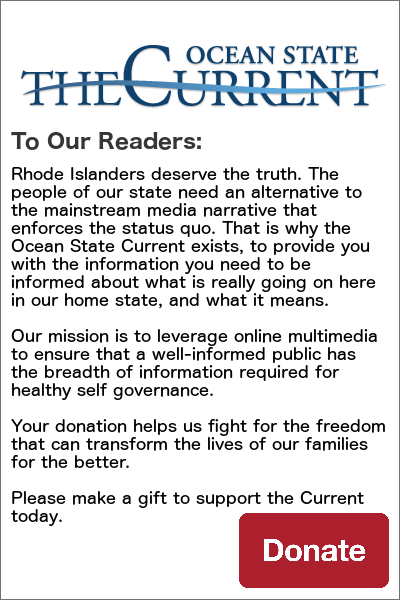The Ethics Commission Considers the Blogger Versus the Eponymous Son
Well, I suppose I should take it as a compliment that the angle of this Providence Journal article by Mark Reynolds and Patrick Anderson is that “a blogger who works for the Rhode Island Center for Freedom and Prosperity recently targeted the vice president of the Tiverton Town Council in a complaint that accuses the councilman of violating state ethics laws.” I wouldn’t have guessed, though, that my local activism would be more of a hook to Providence Journal readers than an ethics investigation of the eponymous son of Speaker Mattiello’s House majority whip.
For the record, when Anderson asked me on the phone whether “blogger” was an appropriate title, I told him that I’m the research director for the Center and the managing editor of the Ocean State Current. I also made clear that this complaint was more in line with my activities for the Tiverton Taxpayers Association than for the Center. Of course, my employment by the Center would be relevant to a statewide audience. Also relevant to the article would have been some indication that, beyond churning out blog posts, I do policy research for the Center, which includes reading reams of legislation and analyzing data and laws (including the Code of Ethics) as a resource for the Rhode Island center-right.
The fact that the Ethics Commission will be hearing the complaint at all means the investigators find it plausible. The protestations of John Edwards, V, notwithstanding, this should be open-and-shut matter for the Ethics Commission. Here’s some language from the Ethics Commission advisory opinion (2002-006) to which the article refers (citations removed):
It is the opinion of the Rhode Island Ethics Commission that Westerly Town Councilors, municipal elected positions, who are employed by or own businesses that are members of the Greater Westerly-Pawcatuck Chamber of Commerce may participate in the Council’s consideration of a matter involving the Chamber of Commerce. However, Councilors who serve as directors/officers of that entity must recuse from participation and/or vote in any matters involving the Chamber of Commerce.
Under the Code of Ethics, a public official may not participate in any matter in which he or she an interest in substantial conflict with the proper discharge of his or her duties in the public interest. An official will have an interest in substantial conflict with his or her official duties if he or she has a reason to believe or expect that a “direct monetary gain” or a “direct monetary loss” will accrue, by virtue of the public official’s activity, to the official, a family member, a business associate, an employer, or any business which the public official represents. Also, Section 5(f) of the Code requires a public official to recuse himself or herself from voting or otherwise participating in the consideration and/or disposition of a matter involving a business associate. A “business associate” is defined as any individual or entity joined with a public official “to achieve a common financial objective.”
Edwards was instrumental, as a council member, in securing funds from the Town of Tiverton for the Chamber of Commerce on whose board he sits. Contrary to Edwards’s reasoning, it isn’t “direct monetary gain” to the elected official, but to the “business associate,” and officials are business associates of an organization if “they serve either as members of the Board of Directors or in other leadership positions that permit them to affect the financial objectives of the organization.” Granted, this opinion was written in 2002, but it has been cited without correction many times in the years since.
[box type=”note” style=”rounded”]To Our Readers: We need your support to challenge the progressive mainstream media narrative. Your donation helps us deliver the truth to Rhode Islanders. Please give now.[/box]
In his own defense, Edwards also claims that he asked Town Solicitor Anthony DeSisto whether he could participate in this matter before the council and received a green light. In legalese, he’s saying that any violation his actions may have, in fact, been were not “knowing and willful.” The commission should disregard this argument for both theoretical and legal grounds.
Theoretically, the commission would abrogate its authority as the state’s guardian of the Code of Ethics if it were essentially to empower every lawyer in the state to issue first-violation-free cards to public officials. Every official subject to the code would have incentive to seek advisory opinions not from the Ethics Commission — which they have every reason to know is their responsibility — but from some lawyer who will advise them that whatever they want to do is permitted.
However obvious this theoretical point may be, the Ethics Commission would have to contradict it if the law so required. Fortunately, the law does not require it, because, as written, the Code of Ethics allows for distinctions between “knowing and willful” violations and other violations. In the list of violations described in Rhode Island General Law § 36-14-5, for example, it is only a violation to “disclose… confidential information” if it is done “willfully and knowingly.” Other violations do not have this language.
On the sentencing end, the law provides for additional penalties if violations are “knowing and willful,” such as removal from office (36-14-14) and classification as a misdemeanor (36-14-19). Indeed, if any violation whatsoever must be “knowing and willful,” the commission’s regulations (1020) would not allow it even to proclaim something as a violation for the purpose of requiring the “violator to cease and desist.”
In summary, the violation is obvious, but the degree and circumstances should prevent the penalty from being unreasonable. Inasmuch as stockades have gone out of fashion, paying back the town for the expense would be fair in this blogger’s estimation.



